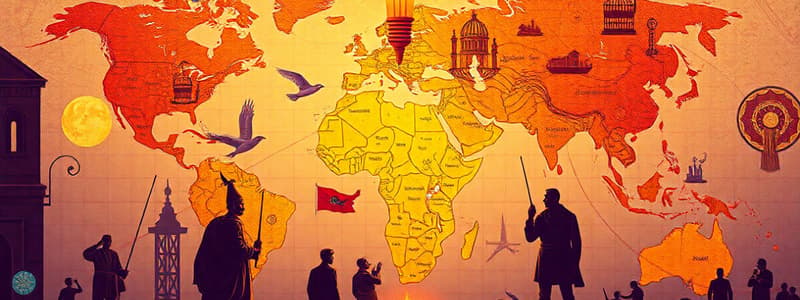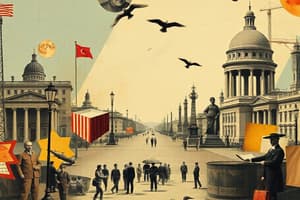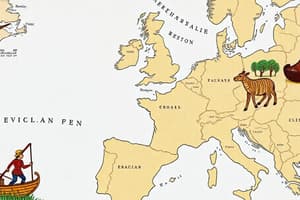Podcast
Questions and Answers
What was the driving force behind European exploration in the 15th century?
What was the driving force behind European exploration in the 15th century?
- Search for gold
- Accessing Asian goods (correct)
- Spreading democracy
- Escaping religious persecution
Which commodity drove the Atlantic slave trade?
Which commodity drove the Atlantic slave trade?
- Sugar (correct)
- Coffee
- Tobacco
- Cotton
The Columbian Exchange was primarily:
The Columbian Exchange was primarily:
- An exchange of ideas
- A European trade union
- A military alliance
- A transfer of goods, people, and diseases (correct)
The Portuguese established a trading post empire in:
The Portuguese established a trading post empire in:
Which nation became the dominant power in the spice trade after Portugal?
Which nation became the dominant power in the spice trade after Portugal?
Which of the following was NOT a consequence of the Atlantic slave trade?
Which of the following was NOT a consequence of the Atlantic slave trade?
Which empire controlled much of the silver trade in the 16th century?
Which empire controlled much of the silver trade in the 16th century?
The fur trade primarily took place in:
The fur trade primarily took place in:
What was a significant environmental impact of the fur trade?
What was a significant environmental impact of the fur trade?
Which of the following was a major port in the transatlantic trade?
Which of the following was a major port in the transatlantic trade?
How did the silver trade link Europe, Asia, and the Americas?
How did the silver trade link Europe, Asia, and the Americas?
What were two major consequences of the Columbian Exchange for indigenous populations?
What were two major consequences of the Columbian Exchange for indigenous populations?
Describe one reason why sugar plantations were significant in the Atlantic economy.
Describe one reason why sugar plantations were significant in the Atlantic economy.
How did joint-stock companies like the Dutch East India Company influence global trade?
How did joint-stock companies like the Dutch East India Company influence global trade?
Who initiated the Protestant Reformation?
Who initiated the Protestant Reformation?
The Protestant Reformation began in:
The Protestant Reformation began in:
What was the Catholic Church's response to the Reformation?
What was the Catholic Church's response to the Reformation?
The Enlightenment was primarily concerned with:
The Enlightenment was primarily concerned with:
What was a major goal of the Jesuits?
What was a major goal of the Jesuits?
Which philosopher supported freedom of speech and religion?
Which philosopher supported freedom of speech and religion?
What was the heliocentric model of the universe?
What was the heliocentric model of the universe?
Galileo was condemned by the Catholic Church for:
Galileo was condemned by the Catholic Church for:
What was John Locke's idea about government?
What was John Locke's idea about government?
The Enlightenment thinker most associated with economic theory was:
The Enlightenment thinker most associated with economic theory was:
What was one way the Protestant Reformation changed European society?
What was one way the Protestant Reformation changed European society?
How did the Scientific Revolution contribute to technological progress?
How did the Scientific Revolution contribute to technological progress?
What role did women play in promoting Enlightenment ideas?
What role did women play in promoting Enlightenment ideas?
Describe one reason the Catholic Church opposed Galileo's work.
Describe one reason the Catholic Church opposed Galileo's work.
The Scientific Revolution emphasized:
The Scientific Revolution emphasized:
Who discovered the laws of planetary motion?
Who discovered the laws of planetary motion?
The Enlightenment thinker who argued for separation of powers was:
The Enlightenment thinker who argued for separation of powers was:
The social contract theory states:
The social contract theory states:
Which invention played a key role in the Scientific Revolution?
Which invention played a key role in the Scientific Revolution?
Isaac Newton is famous for:
Isaac Newton is famous for:
Which Enlightenment thinker influenced the U.S. Declaration of Independence?
Which Enlightenment thinker influenced the U.S. Declaration of Independence?
Enlightenment ideas led to:
Enlightenment ideas led to:
Which thinker argued for free markets in The Wealth of Nations?
Which thinker argued for free markets in The Wealth of Nations?
Rousseau believed in:
Rousseau believed in:
Which region supplied the majority of slaves for the Atlantic slave trade?
Which region supplied the majority of slaves for the Atlantic slave trade?
What was a key outcome of the French Revolution?
What was a key outcome of the French Revolution?
Flashcards
Driving force of 15th-century European exploration
Driving force of 15th-century European exploration
The desire for access to Asian goods, like spices and silks.
Commodity of Atlantic slave trade
Commodity of Atlantic slave trade
Sugar was the most important commodity driving the Atlantic slave trade, due to its high demand.
Columbian Exchange
Columbian Exchange
An exchange of goods, people, and diseases between the Americas and the Old World.
Portuguese Trading Post Empire Location
Portuguese Trading Post Empire Location
Signup and view all the flashcards
Dominant power in spice trade after Portugal
Dominant power in spice trade after Portugal
Signup and view all the flashcards
Consequence of Atlantic slave trade
Consequence of Atlantic slave trade
Signup and view all the flashcards
16th-century silver trade controller
16th-century silver trade controller
Signup and view all the flashcards
Fur trade location
Fur trade location
Signup and view all the flashcards
Environmental impact of fur trade
Environmental impact of fur trade
Signup and view all the flashcards
Major transatlantic trade port
Major transatlantic trade port
Signup and view all the flashcards
Silver trade's interconnectedness
Silver trade's interconnectedness
Signup and view all the flashcards
Columbian Exchange Consequences (Indigenous)
Columbian Exchange Consequences (Indigenous)
Signup and view all the flashcards
Significance of Sugar Plantations
Significance of Sugar Plantations
Signup and view all the flashcards
Joint-Stock Companies' Influence
Joint-Stock Companies' Influence
Signup and view all the flashcards
Initiator of Protestant Reformation
Initiator of Protestant Reformation
Signup and view all the flashcards
Location of Protestant Reformation start
Location of Protestant Reformation start
Signup and view all the flashcards
Catholic Church's response to Reformation
Catholic Church's response to Reformation
Signup and view all the flashcards
Focus of the Enlightenment
Focus of the Enlightenment
Signup and view all the flashcards
Jesuit Major Goal
Jesuit Major Goal
Signup and view all the flashcards
Philosopher supporting freedom of speech and religion
Philosopher supporting freedom of speech and religion
Signup and view all the flashcards
Study Notes
Chapter 14: Economic Transformations (1450-1750)
- European Exploration (15th Century): Driven by the search for Asian goods, not primarily escaping religious persecution or spreading democracy
- Atlantic Slave Trade: Primarily driven by the demand for sugar.
- Columbian Exchange: A transfer of goods, people, and diseases between the Old and New Worlds.
Chapter 15: Cultural Transformations (1450-1750)
- Protestant Reformation Initiator: Martin Luther
- Beginning of Reformation: Germany
- Catholic Church Response: Counter-Reformation
- Enlightenment Focus: Primarily scientific discovery
Chapter 16: Science and Enlightenment (1450-1750)
- Scientific Revolution Emphasis: Experimentation and observation
- Planetary Motion Discoverer: Kepler
- Co-inventor of Calculus with Newton: Leibniz
- Enlightenment Thinker on Separation of Powers: Montesquieu
Chapter 17: Atlantic Revolutions and Their Echoes (1750-1914)
- French Revolution Inspiration: American Revolution
- Haitian Revolution Leader: Toussaint Louverture
- Haitian Revolution Uniqueness: Only successful slave-led revolution.
- Latin American Revolution Leader: Simon Bolivar
Chapter 18: Industrialization and Its Impact (1750-1900)
- Industrial Revolution Power Source: Steam Engine
- Industrialization Social Change: Urbanization (migration to cities).
- Industrial Revolution's Global Impact: Increased trade and faster transportation.
- Industrial Revolution Cause: Agricultural revolution and increased food production.
Studying That Suits You
Use AI to generate personalized quizzes and flashcards to suit your learning preferences.




